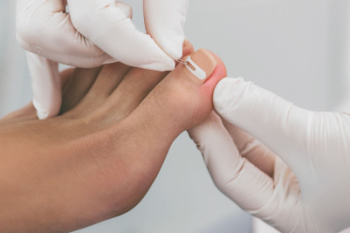
(908) 381-8160Berkeley Heights
 An ingrown toenail occurs when the edge of a toenail grows into the surrounding skin, causing pain and swelling. This often happens due to improper nail trimming, wearing tight shoes, or having naturally curved nails. When the toenail pierces the skin, it can create an entry point for bacteria, leading to an infection. Signs of an infected ingrown toenail can include redness, swelling, warmth, and pus. If the infection is not treated, it can worsen, leading to severe pain, increased swelling, and potentially serious complications such as spreading the infection or a bone infection. To treat an ingrown toenail infection, start by soaking the affected foot in warm, soapy water several times a day to reduce swelling and relieve discomfort. After soaking, apply an antibiotic ointment and cover the area with a clean bandage. Avoid wearing tight shoes and opt for open-toed footwear to reduce pressure on the toe. If the infection persists or worsens, it is suggested that you schedule an appointment with a podiatrist who can provide proper treatment, which may include minor procedures to remove part of the nail and prevent further issues.
An ingrown toenail occurs when the edge of a toenail grows into the surrounding skin, causing pain and swelling. This often happens due to improper nail trimming, wearing tight shoes, or having naturally curved nails. When the toenail pierces the skin, it can create an entry point for bacteria, leading to an infection. Signs of an infected ingrown toenail can include redness, swelling, warmth, and pus. If the infection is not treated, it can worsen, leading to severe pain, increased swelling, and potentially serious complications such as spreading the infection or a bone infection. To treat an ingrown toenail infection, start by soaking the affected foot in warm, soapy water several times a day to reduce swelling and relieve discomfort. After soaking, apply an antibiotic ointment and cover the area with a clean bandage. Avoid wearing tight shoes and opt for open-toed footwear to reduce pressure on the toe. If the infection persists or worsens, it is suggested that you schedule an appointment with a podiatrist who can provide proper treatment, which may include minor procedures to remove part of the nail and prevent further issues.
Ingrown toenails can become painful if they are not treated properly. For more information about ingrown toenails, contact Dr. Janet Leicht of New Jersey. Our doctor can provide the care you need to keep you pain-free and on your feet.
Ingrown Toenails
Ingrown toenails occur when a toenail grows sideways into the bed of the nail, causing pain, swelling, and possibly infection.
Causes
Prevention
Because ingrown toenails are not something found outside of shoe-wearing cultures, going barefoot as often as possible will decrease the likeliness of developing ingrown toenails. Wearing proper fitting shoes and using proper cutting techniques will also help decrease your risk of developing ingrown toenails.
Treatment
Ingrown toenails are a very treatable foot condition. In minor cases, soaking the affected area in salt or antibacterial soaps will not only help with the ingrown nail itself, but also help prevent any infections from occurring. In more severe cases, surgery is an option. In either case, speaking to your podiatrist about this condition will help you get a better understanding of specific treatment options that are right for you.
If you have any questions please feel free to contact our office located in Berkeley Heights, NJ . We offer the newest diagnostic and treatment technologies for all your foot and ankle needs.